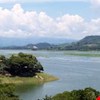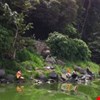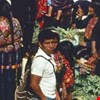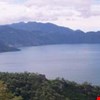
The Reventazon River Basin has been subjected to severe degradation, mainly through water pollution, leading to proliferation of disease, increased cost of drinking water, and endangered biodiversity. Action was taken by establishing the Committee for the Management and Planning of the Reventazon River Basin working with conservation and land management. The key lesson for success is the importance of the coordination of the different actors that deal with the basin management.

There were concerns that Lake Arenal in Northern Costa Rica was threatened due to problems of deforestation and possible premature sedimentation, leading the government to take action, resulting in successful national and local benefits in terms of energy produced and area irrigated. The most important lesson learned is the importance of consulting all parties involved before initiating the project to achieve the best result.

The Costa Rican government decided to revise its system of water use levy when it became evident that it was disproportionately low. Action was taken by key stakeholders to reconstruct a design of the water use levy to reflect two basic elements of water charge: water use rights and environmental water services. From this experience, the most important lesson is that political will must support legal and technical works when reforming economic instruments.

In Costa Rica, action was taken to introduce water pricing to pay for services provided by forests in watershed areas. As a result, Costa Rica’s watershed owners are beginning to be rewarded for providing water, whether for drinking or for generating electricity. The main lesson is that initiatives that ensure local groups are included in the benefits of conservation are needed to involve them in helping to protect the water catchment areas.

El Cerrito Canton community has spent decade attempting to get access to clean water. Action was taken to organise a Community Development Association, leading to the execution of a potable water project. The key insight drawn from this case is that, it is key for communities to have water access and management is their capacity to get organised.

La Poza micro-basin is experiencing severe environmental degradation, mainly due to unsustainable deforestation practices executed to expand agricultural land. To combat the issues, action was taken to implement IWRM. Throughout the implementation, there has been a high level of community participation facilitated by extensive capacity building and training in environmental management. The primary lesson drawn from this example is the crucial importance of community participation for a successful implementation.

El Salvador has experienced an increased vulnerability due to Climate Change. To tackle the challenges, an Early Warning System has been installed. This is part of the strategy of the local government to reduce the vulnerability and develop the capacity of the area to deal with floods and landslides. One lesson learnt is that political stability in an area is a great asset when carrying out any political reform.

The overexploitation and pollution of water resources of the San Jeronimo River, together with agricultural developments and deforestation, have generated conflicts between bordering communities. To address these, the San Jeronimo Basin Committee was created, mantling the role as a negotiating body and with a mission to implement IWRM. The key lesson learnt is that for success, it is crucial that local organisations take their social responsibility.

The lack of laws and regulations, as well as good administration and management, contribute to poor water governance. In the Naranjo river basin, action was taken to implement IWRM after initiatives stemming from individuals with personal conviction of its importance. This has led to the creation of some formal legislation and the process of implementing IWRM. This consequently illustrates the potential important role of individuals in driving policy change.

The Lake Atitlán basin experiences serious problems of water pollution, soil erosion and forest and biodiversity losses. Action was taken to establish the Authority for the Sustainable Management of the Atitlán Basin. However, barriers such as lack of public participation, institutional coordination and investment funds have only ensured limited success. The key lesson learnt is that the main barriers to an integrated management of water resources in the basin are strongly interlinked.